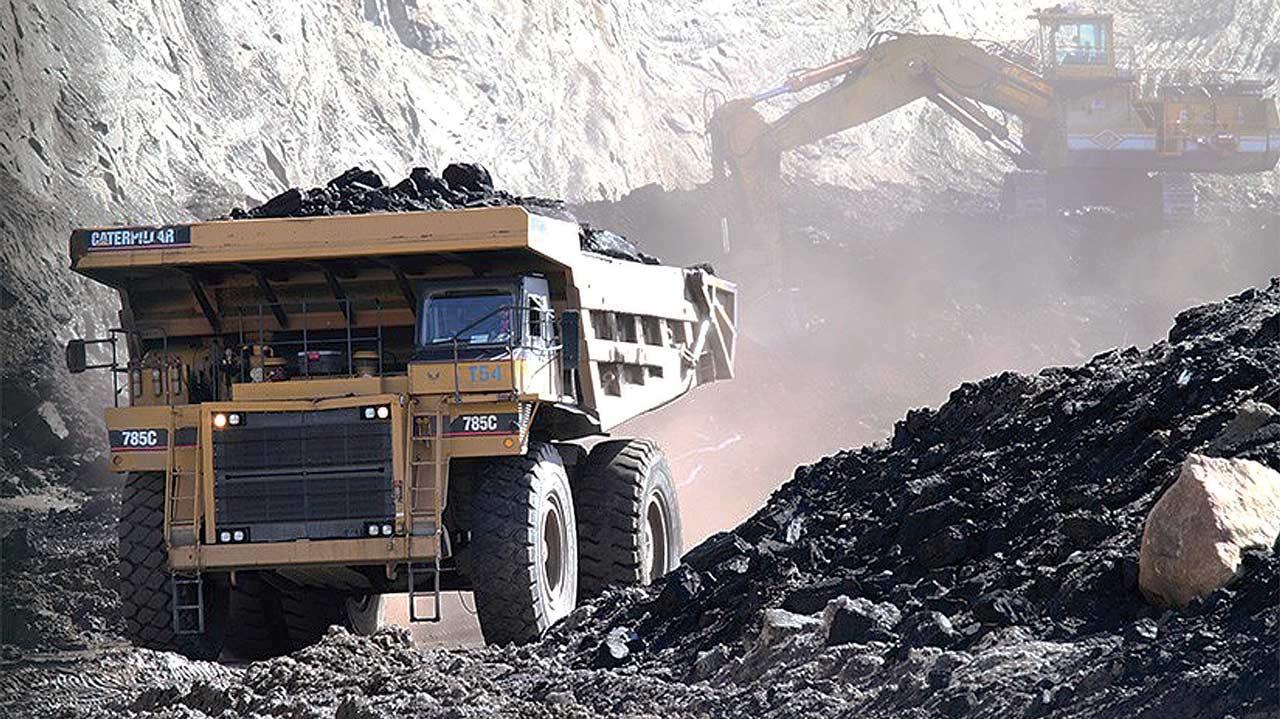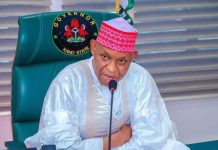By Abba Hamisu Sani
Africa-Press – Nigeria. Nigeria is one of the countries with large mineral resources deposits in Africa.The country is endowed with over forty types of minerals including marble,coal ,iron ore ,gold ,Silica,lead,zinc,tin ore, manganese ,granite,laterite and lime stone.
Mining activities in Nigeria accounts for only 0.3 percent of the country’s Gross Domestic Product (GDP).This can not be unconnected with the influence of its vast oil resources.
The Nigerian mining Industry is underdeveloped which forces the country with vast mineral deposits to import minerals that can be produced domestically ; such as iron ore and salt.
As Nigeria is operating federal
system of government which shares powers between three units that include Federal ,States and Local government.
The rights for the control of the mineral resources are under the powers of the Federal government.
It is this unit of the government that grants titles to organizations to explore mine, and sells mineral resources.
Historically Prior to 1903 Nigerian mining sector was purely traditional.Northern protectorates Mineral Survey was created by the British colonial government as by the 1940’s Nigeria was a major producer of tin, climate and coal.
Oil discovery in 1956 was the cause of the destruction of the other minerals extraction as the government and industry shifted their focus to the new resource.
The Nigerian Civil war from 1967 to 1970 led many expatriate mining experts to leave the country .
Ministry of solid Minerals and Development which is tasked with the responsibility of overseeing the management of all mineral resources in Nigeria.
Initially the Industry was monopolized by state owned Public corporations.This led to a decline in productivity in almost all mineral Industries.
Privatization of the Mining sector
Obasanjo’s administration began the process of selling off government owned Cooperation to private investors in 1999.
The Industry has picked up since the Economic Diversification Agenda from Oil and Gas to Agriculture.
The privatization policy assisted in increasing the exploration and exploitation of construction
materials such as limestone and granite for cement production and infrastructure development of Nigeria
The privatization also brought an increase in foreign direct investment in exploration and exploitation of gold, iron ore, coal, gypsum, lead and zinc, tin and columbite, among others, leading to the Solid Minerals.
The Roadmap of 2012 adds value to mining and processing.
The roadmap was re-launched in 2016 to ensure policy continuity and consistency in the sector, though not so much has been recorded as gains.
Total earnings from the sector since 2016 that the roadmap was launched up till the NEITI report for 2018 was only 6,420,133.50 dollars (5 billion Naira).
About 1.6 billion Naira was earned in 2016, 1.5 billion Naira in 2017 from 59 companies and 1.9 billion Naira from 69 companies.
About 80 percent of mining taking place in the North West of Nigeria is illegal.
Some reports reveal that out of about 3,163 companies granted 1,443 licenses to mine in Nigeria , just 30 percent engaged in active quarry, mining and exploration activities.
Dominating the sector are illegal miners, medium scale operators and artisanal miners.
Total revenue yield from royalties paid by the major players between 2007 and 2010 was 2.2 billion Naira ,earnings from ground rents/annual surface rents was about 173.9 million naira , tax, 51.4 million and levies, 122.9 million Naira
Since there was no sufficient data or proper monitoring of the company, there was no way to assess the amount of solid minerals they produced, sold or utilized, therefore, royalty payment would be based only on what the operators disclosed to the regulators.
In the 2013-2014 NEITI report, total revenue from the solid minerals sector amounted to N33.9 billion in 2013.
Subsequent audit reports of 2015-2016 and 2017-2018 showed no significant improvement. The 2018 earnings from the solid minerals sector looked like the highest since 2007. The solid minerals sector contributed about N69.5 billion to the federation revenue.
Conflicts as challenges in the mining areas across the country
Nigerian gold is found in the North-West, North-Central and South-West regions. The country currently has the 12th largest iron ore reserves stored in Kogi, Enugu, Niger, Zamfara and Kaduna states. The lead-zinc ores are usually together and are found in commercial quantities along the Benue trough, extending from Abakaliki in Ebonyi State through the middle Benue trough, to upper Benue trough in Bauchi State. Limestone is present in over 30 states of the federation, with the largest deposits found in the South-West and North-Central regions. Nigeria has bituminous coal with low sulfur and ash content and can be found in the North-East, North-Central and South-East regions of the country, yet there has been poor remuneration to the GDP.
One significant challenge at some of the locations of the solid minerals is conflict. In a bid to exploit gold deposits in Zamfara State, for example, there were conflicts with bandits and gunmen. The prospects are usually undermined by criminals who profiteers from the sector at the expense of vulnerable populations.
Most conflicts in Nigeria are attributed to the location of solid minerals in such an environment, even up to the lithium in Nasarawa State. According to a report by Maurice Ogbonnaya, Senior Research Consultant, Institute for Security Studies (ISS) Pretoria, South Africa, an estimated 80 percent of mining in the North West region is carried out illegally and on an artisanal basis by local populations. The mining of large untapped mineral deposits in the area, especially gold, which has strategic importance and economic value, is at the root of community violence.
The government’s ban of artisanal gold mining in Zamfara State and across the region and the deployment of soldiers to enforce the ban since April 2019 yielded low results as illegal mining and its associated conflicts continued.
Dele Alake is the Nigerian new Minister of Solid Minerals. He said how can a Country with Industrial ,energy , metallic construction and precious minerals including gold during the manganese,bitumen,lithium,iron ore,lead,zinc ,limestones,uranium,columbite ,barytes ,kaolin ,gemstones,coal,topaz,copper in massive proportions fail to use these resources to liberate the citizens ?
The Minister stated this during a press conference recently in Abuja. “At the last count, our estimated reserves include gold (one million ounces); limestone (568 metric tonnes); lead/zinc; Barite 15 million metric tonnes; bitumen, 1.1 billion barrels; iron ore, three billion metric tonnes and coal. How did a sector with over two million operators, including over 633 small-scale companies and 251,500 registered miners, struggle to give the economy capital and human development?” Alake said.
He listed inefficient geo data, weak implementation and enforcement, poor environmental, safety and health policies, fragility and conflict, unregulated artisanal mining, low technical capacity, lack of access to financing, weak inter-governmental and inter-agency coordination and weak federal/state relations over mining land as barriers to the development of the sector.
Tobi Bamidele is a marketing consultant.He said Commercial quality minerals resources abound in Nigeria but that is not the issue as a grand quantity of gold ,diamonds,and other precious resources but finding the technical expertise and financial savvy to take advantage of the resources has long plagued the region.
He said the Federal government of Nigeria is the custodian of the mineral resources on behalf of the citizenry and they are taking steps to make the resources more lucrative than before but investors have long been weary of sending their money to an area known for its political instability.
“in the decades past ,the government granted mineral rights to investors so they could explore ,mine and get the minerals to market but the government preferred to act as an owner and operator”The marketing expert said
This micro- management methodology on the investor’s dime has long been a major detractor to investors who want to have full control of how their dollars are used and profited from.
Now that the Nigerian government is taking on more of an regulator role the investors are coming back .To make the market for Nigerian mining more competitive ,they have adopted a first -come , first -serve basis for investors.
Incentives for the new foreign investors
In an effort to encourage foreign investments ,the ministry of solid Minerals Development has added incentives such as a three – year tax moratorium for new mining interests which can be extended for an additional two years .
The analyst said mining interests can be granted exemptions from import and export duties in exchange for implementing tunneling and drilling equipment, mining machinery ,and accessories .
Another incentive for the mineral title holders are guaranteed transfer of funds ,for free via the Central Bank of Nigeria and are also granted permission to keep a portion of their foreign exchange monies in a private foreign exchange account to be used for purchasing spare parts and other resources needed to maintain mining operations .
However with such an initiative , Nigerians will get more job opportunities for its youth through domestic and foreign investors that will engage in different areas of mining.
Places like Zamfara state that have high deposits of gold but are threatened by insurgency will have enough security presence if such government policies on the extractive sector are implemented .
Additionally the Nigerian economy will receive more boost as other mineral resources will complement the oil revenue which the country has relied on for years.
Illegal mining that is rampant in the minerals reach areas will be minimized and the artisans in the illegal practice will be employed by the well organized operators.
This will also help in protecting the environment of the mining areas and save the communities within from different hazards course by the mining activities.
For More News And Analysis About Nigeria Follow Africa-Press







